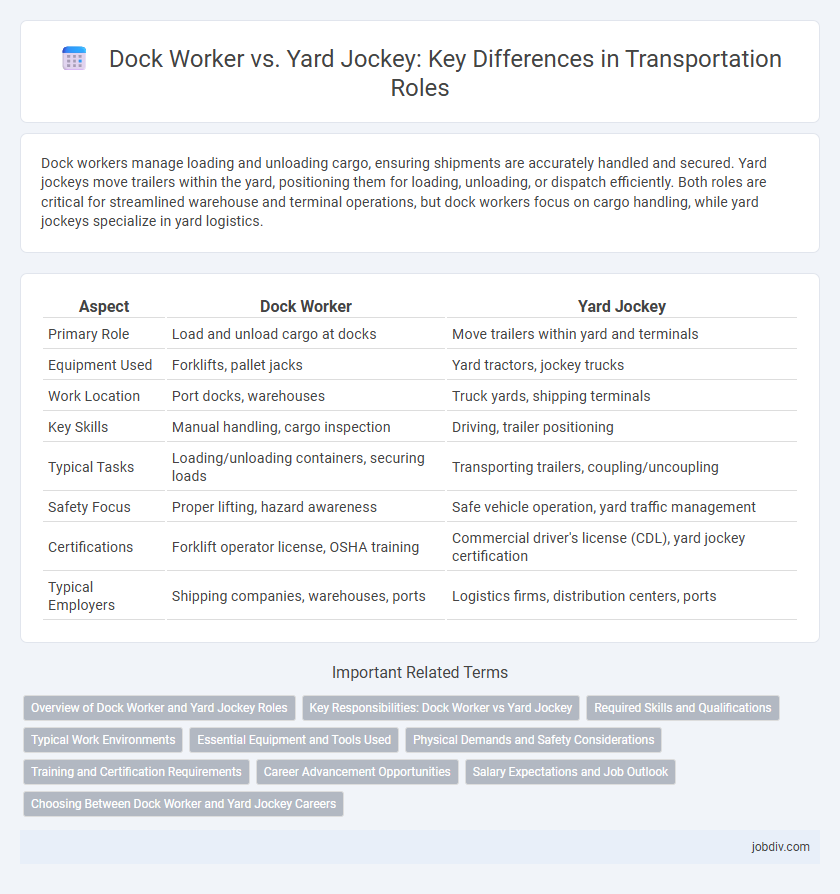Dock workers manage loading and unloading cargo, ensuring shipments are accurately handled and secured. Yard jockeys move trailers within the yard, positioning them for loading, unloading, or dispatch efficiently. Both roles are critical for streamlined warehouse and terminal operations, but dock workers focus on cargo handling, while yard jockeys specialize in yard logistics.
Table of Comparison
| Aspect | Dock Worker | Yard Jockey |
|---|---|---|
| Primary Role | Load and unload cargo at docks | Move trailers within yard and terminals |
| Equipment Used | Forklifts, pallet jacks | Yard tractors, jockey trucks |
| Work Location | Port docks, warehouses | Truck yards, shipping terminals |
| Key Skills | Manual handling, cargo inspection | Driving, trailer positioning |
| Typical Tasks | Loading/unloading containers, securing loads | Transporting trailers, coupling/uncoupling |
| Safety Focus | Proper lifting, hazard awareness | Safe vehicle operation, yard traffic management |
| Certifications | Forklift operator license, OSHA training | Commercial driver's license (CDL), yard jockey certification |
| Typical Employers | Shipping companies, warehouses, ports | Logistics firms, distribution centers, ports |
Overview of Dock Worker and Yard Jockey Roles
Dock workers manage the loading and unloading of cargo, ensuring the safe and efficient transfer of goods between ships and warehouses. Yard jockeys operate specialized trucks within transport terminals to move trailers and containers, optimizing yard logistics and storage positioning. Both roles are essential for maintaining the flow of freight in shipping and distribution centers.
Key Responsibilities: Dock Worker vs Yard Jockey
Dock workers are primarily responsible for loading and unloading cargo from trucks, securing freight, and organizing shipments within the dock area to ensure efficient transfer and storage. Yard jockeys operate terminal tractors to move trailers within the yard, repositioning equipment for outbound or inbound transport while coordinating with dock workers to streamline workflow. Both roles require adherence to safety protocols and effective communication to maintain seamless freight handling and yard operations.
Required Skills and Qualifications
Dock workers require physical strength, attention to detail, and knowledge of loading/unloading procedures, with certifications such as OSHA safety training enhancing job performance. Yard jockeys must possess strong driving skills, familiarity with yard management systems, and a commercial driver's license (CDL) due to their responsibility for moving trailers within the yard. Both roles demand excellent communication and teamwork abilities to ensure efficient and safe cargo handling operations.
Typical Work Environments
Dock workers primarily operate in busy shipping docks and warehouses where they handle loading, unloading, and organizing goods, often working outdoors and in contact with heavy machinery. Yard jockeys navigate containers and trailers in intermodal yards or distribution centers, maneuvering terminal tractors to position freight efficiently in tightly packed spaces. Both roles demand adherence to safety protocols in fast-paced, industrial environments focused on freight movement and logistics.
Essential Equipment and Tools Used
Dock workers rely heavily on pallet jacks, forklifts, and dock levelers to efficiently load and unload cargo while ensuring safety and speed. Yard jockeys primarily use terminal tractors and yard trucks designed for moving trailers within the yard, optimizing trailer sorting and placement. Both roles require communication devices and safety gear such as gloves, helmets, and reflective vests to maintain operational safety and coordination.
Physical Demands and Safety Considerations
Dock workers frequently engage in heavy lifting, repetitive motions, and prolonged standing, requiring significant physical endurance and strength to safely load and unload cargo. Yard jockeys operate terminal tractors in confined spaces, demanding steady concentration, precise maneuvering skills, and awareness of moving equipment to prevent accidents. Both roles prioritize strict adherence to safety protocols, such as the use of personal protective equipment (PPE) and ergonomic practices, to minimize injury risks in high-traffic, hazardous environments.
Training and Certification Requirements
Dock workers typically require on-the-job training focusing on safe loading and unloading practices, with certifications like OSHA safety training enhancing their qualifications. Yard jockeys must obtain commercial driver's licenses (CDL) due to their responsibility for moving trailers within yards, often supplemented by forklift or heavy equipment operator certifications. Both roles emphasize safety protocols, but yard jockeys face stricter regulatory training due to maneuvering and vehicle operation demands.
Career Advancement Opportunities
Dock workers and yard jockeys both play critical roles in transportation logistics, but career advancement opportunities differ between these positions. Dock workers can progress to supervisory roles such as dock manager or logistics coordinator, leveraging experience in cargo handling and safety compliance. Yard jockeys, skilled in operating yard trucks and managing trailer movements, often advance to yard manager or fleet supervisor positions, capitalizing on expertise in vehicle coordination and operational efficiency.
Salary Expectations and Job Outlook
Dock workers typically earn an average annual salary ranging from $30,000 to $45,000, with job opportunities expected to grow by 5% over the next decade due to steady demand in shipping and logistics. Yard jockeys, responsible for moving trailers within freight yards, often have salaries between $35,000 and $50,000, benefiting from a slightly faster job growth rate of around 7% driven by increased warehouse automation. Both roles offer competitive wages, but yard jockey positions may provide better salary prospects and growth potential in evolving transportation hubs.
Choosing Between Dock Worker and Yard Jockey Careers
Dock workers primarily handle loading and unloading goods at shipping docks, requiring physical strength and attention to safety protocols. Yard jockeys operate terminal tractors to move trailers within shipping yards, demanding skilled driving and coordination abilities. Career choice depends on preferred work environment: dock workers thrive in hands-on, fast-paced settings, while yard jockeys suit those interested in vehicle operation and yard logistics.
Dock Worker vs Yard Jockey Infographic

 jobdiv.com
jobdiv.com